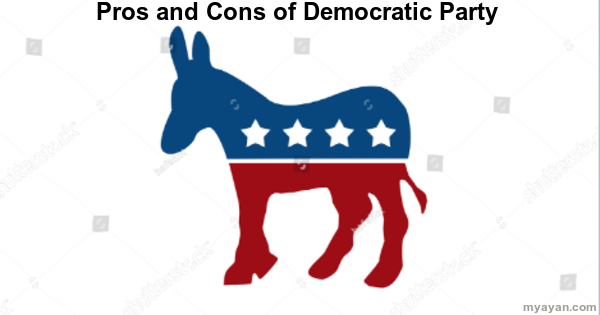The Democratic Party has been a prominent and influential political force in the United States for over 200 years. Known for their progressive views and socially conscious policies, the Democratic Party has always been a champion of the commoner. The politics in the USA are largely driven by two major parties, the Democratic party, and the Republican party. If you ask a person in the street, they will most likely tell you there is no difference between them. However, when discussing issues and policies, it becomes clear that the two parties have very different approaches to governing the country. Before you focus on differences, it's important to understand the main principles and pros and cons of the Democratic party.
The fundamental principle of the Democratic party is that government should be involved in citizens' lives when it comes to regulating and protecting them from harm or providing basic services. That's where certain pros democratic party come into play. These include:
One of the primary advantages of the Democratic Party is its commitment to inclusivity. The party platform is built on a foundation of diversity and inclusion for all races, religions, and cultures. This helps to promote tolerance and acceptance across the country, which is crucial in our modern, interconnected world.
From supporting equal pay for women to promoting civil rights, the Democratic Party is committed to social justice and equality. The party works hard to promote legislation that will reduce inequality in society and give those who are less fortunate a chance at a better life.
The Democratic Party has historically been committed to protecting the environment and promoting sustainability. Democratic politicians have done everything in their power to address climate change, preserve public lands, and conserve natural resources.
The prospect of gun control laws is a contentious issue in American politics, but the Democratic Party has always been committed to gun control measures to protect the public's safety. Stronger background checks, limiting access to dangerous weaponry, and supporting mental health care access are just a few of the proposed solutions from the Democratic Party for gun control and public safety.
One of the key rallying cries of the Democratic Party is the push for universal healthcare. With billions of Americans without healthcare access, a push for more affordable and accessible healthcare is a top priority for the Democratic Party.
There are some issues that can be seen as major cons of Democratic Party. These include:
One of the largest criticisms of the Democratic Party is their inefficiency and slow-moving nature, particularly when it comes to passing legislation. Due to their broad, inclusive platform, the Democratic Party often has trouble gaining unanimity on some contentious issues, which can result in deadlock and inaction.
While the Democratic Party has done excellent work in regulating industries that could threaten public welfare and societal well-being, over-regulation can impede the growth of businesses and stifle the economy. Finding the right balance for regulation is a challenge for the Democratic Party.
With multiple factions making up the Democratic Party, conflicts invariably arise in different sections of the party. This division can strip the party members of the capability to enact change and can cause confusion and dissension within the ranks.
The Democratic Party is often criticized for its alleged commitment to tax increases, especially for higher-income earners. Many Republicans believe this could lead to job losses and slower economic growth, while Democrats argue that taxes are necessary to fund important social programs and infrastructure projects.
Every policy and decision made by the Democratic Party has tradeoffs. For example, the move towards clean and renewable energy may increase costs for consumers and businesses, and losing industries that rely on oil and gas can harm economies that depend on those industries.
Both the Democrats and the Republicans have their strengths and weaknesses, but it is important to be able to assess each party objectively. The Democratic Party can boast of its continued focus on inclusivity, environmental concerns, and social equity.
However, the Democratic Party has its weaknesses, such as their inefficiency and complications in passing programs and policies; over-regulation; the ideological divide among factions and raising taxes. By understanding the pros and cons of Democratic Party, you can decide on what policies and candidates best align with people’s values and beliefs, and whom we’d like to support.

Democrats advocate for a progressive tax structure to enhance services and address economic inequality. This is achieved by ensuring the wealthiest Americans shoulder the highest tax rate. Additionally, they prioritize increased government spending on social services while suggesting a reduction in military expenditure.
The Democratic Party is one of the two major political parties within the United States political system, with the distinction of being the oldest existing political party in the nation. Established during the 1830s and 1840s, it not only holds the title of the oldest active voter-based political party in the world but also embodies a rich history and enduring legacy.
Andrew Jackson and Martin Van Buren are considered the founders of the Democratic Party. Established in 1828, the Democratic Party is one of the two major political parties in the United States. Martin Van Buren played a pivotal role in uniting politicians from every state behind the esteemed war hero, Andrew Jackson.
A party system refers to the arrangement of governance by political parties in a democratic nation, as explored in comparative political science. This concept delves into how political parties operate within a country's democratic framework.